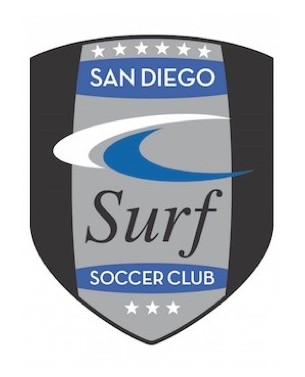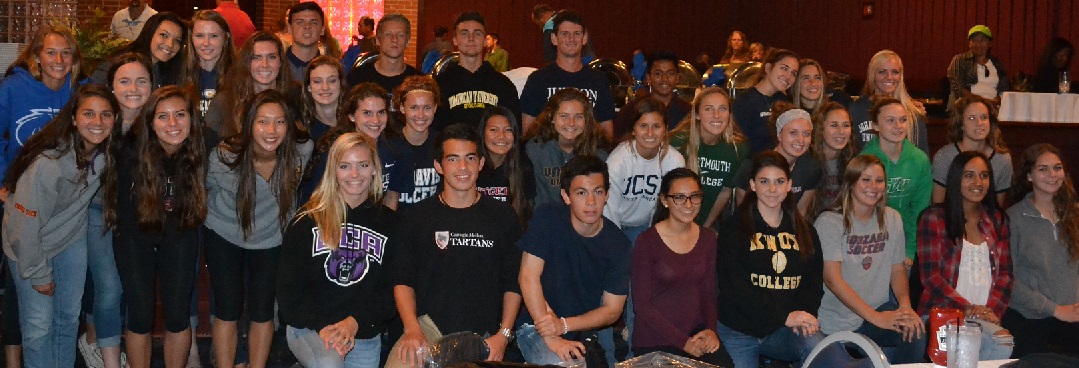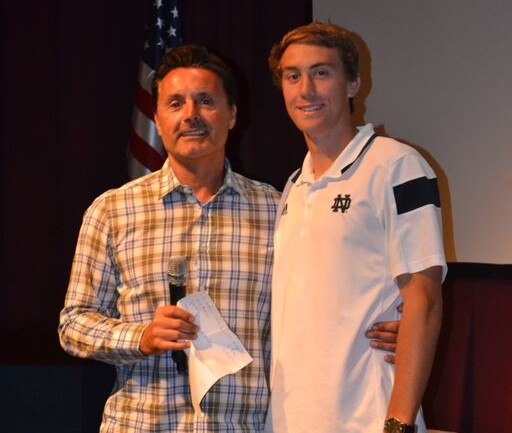Soccer News: San Diego Surf SC Commitment to Getting Players In College
“When it comes to helping our players get into the right college, we are leaving no stone unturned,” said Sean Ganey – Surf SC College Program.
 One of the top youth soccer clubs in America, the San Diego based Surf Soccer Club is well known around the country for accomplishing great victories on the field. While the Southern California youth soccer club may have a great reputation around the country for being a big, prestigious organization, it has a personal approach to helping their players get into college.
One of the top youth soccer clubs in America, the San Diego based Surf Soccer Club is well known around the country for accomplishing great victories on the field. While the Southern California youth soccer club may have a great reputation around the country for being a big, prestigious organization, it has a personal approach to helping their players get into college.
“I feel every youth soccer club college office has the same goals. The benefit I think we have at Surf SC is that we already have a good reputation of producing collegiate players. This position enables us to be patient and place the kids in the right fit,” said Ryan Hernandez who helps head up the Surf SC College Program with Sean Ganey.
Surf SC has both ECNL and US Soccer Development Academy teams competing at the highest level in youth soccer and has won 9 National Youth Soccer Championships.
With just over 1,200 players in the club, Surf SC is committed to helping every player find a good college fit — not just the players that are the top 1% of the most elite teams.
Surf SC 2015 Graduating Class Players have roster spots at the following colleges and universities:
Stanford, University of California LA (UCLA), University of California Berkeley (CAL), Georgetown, UC Davis, John Hopkins, Rutgers University, Notre Dame University, Carnegie Mellon, Tufts, University of California Santa Barbara (UCSB), University of California Irvine, Dartmouth College, University of Southern California (USC), Santa Clara University Michigan, Westmont College, Florida State University, Virginia Tech, University of Arizona, University of San Diego, San Diego State University, Gonzaga, Louisville, Washington State University, Idaho State University, Judson University, Dominican University, Southwestern Christian University, Heidelberg University, Mesa College, Loyola, Utah State University, Vanguard University, Manhattenville, Azusa, Montana State, Southern Virginia, Knox College, CSU San Marcos, CSU Monterey Bay, Palomar College, Chapman University, Claremont McKenna College, Whitworth University.
Among the graduating Surf SC players, 100% of the ECNL team is off to play collegiate soccer as well as several of the US Development Academy players.
Sean Ganey and Ryan Hernandez head up the Surf SC College Program working closely with the club’s Director of Coaching Colin Chester, the player’s team coach and the player to fit the right college fit. Yes, parents are involved of course, but all the college and club coaches say the same words … the process of being recruited to play soccer in college has to come from the player.
Who are Sean Ganey and Ryan Hernandez? Here are a few details on their background:
Ryan Hernandez, Men’s Soccer Associate Head Coach at UCSD was recruited by Surf SC to help head up the College Program with Sean. As a college coach, Ryan knows what other college coaches are looking for when identifying youth soccer players for their university and college teams. Hernandez is in his eight year at UC San Diego Men’s soccer program and has helped the Tritons to four straight winning campaigns.
Sean Ganey joined Surf SC last year in July and is also the Boys Soccer Head Coach at Mater Dei High School. Previously with the Irvine Strikers and the Pateadores, Ganey holds a “B” License and played college in soccer at Vanguard University. A homegrown Southern California youth soccer player turned coach, Ganey has walked down the path of college identification and recruitment. Both Hernandez and Ganey understand the process and can help players successfully navigate these often confusing and important life decisions.
Diane Scavuzzo interviewed Sean Ganey and Ryan Hernandez to understand the youth soccer club’s role in helping players get into college and play collegiate soccer.
Diane Scavuzzo: There are well over 1300 men’s soccer programs available, and approximately 1400 program options for women. How does Surf SC help players determine the best options?
Sean Ganey: Every player/athlete has a unique set of desires. Surf SC helps determine the best fit for each individual player by learning what the needs are for that individual player and placing them accordingly. The process of matching a player with a college should be a fit on both ends. The student athlete should want to be at the school regardless of sport, but should mesh well with the coaching staff, style of play and competitive level.
We help our players realistically set expectations. As the sport has a very high transfer rate, there should be a push to help student athletes choose a realistic school for their individual needs.
Diane Scavuzzo: What does Surf SC do differently?
Ryan Hernandez: We invested and introduced the College Fit Finder. It’s a tool that broadens the access to colleges/universities that our players and coaches may not even be aware of. Players have the ability to search for the school that is the best fit as well as keep the family and club updated on their progress.
Diane Scavuzzo: What does this cost the player?
Ryan Hernandez: This program is free for all Surf players.
Sean Ganey: Our history of sending top student athletes to college obviously aids in the process as our players are looked at and college coaches know what to expect. On the Surf side we try to aid each individual at every possible need. Whether that’s providing them with a great tool such as the College Fit Finder, providing them with multiple Q and A college nights with top coaches at each Division level, bringing in a SAT specialist, a Financial expert, a compliance officer at a university, and meeting with the individual as their coach, we feel that we are leaving no stone unturned.
Diane Scavuzzo: How much should a family rely on the youth soccer club to help?
Sean Ganey: I think the family has to do its own work within its structure to determine what the best fit is for their family, however, I think the club can be relied on to provide the tools that are mentioned above. At the end of the day, the club should provide options and resources necessary for those applicable student athletes to make a educated and sound decision on the student athletes future.

Diane Scavuzzo: What age are players usually scouted and offered spots? Why are girls scouted and ‘offered verbal commitments’ so much earlier than boys?
Sean Ganey: Girls are scouted earlier than boys mainly at the D1 level for several different reasons. First is that girls mature earlier than boys. So coaches feel that they can accurately — right or wrong — project a player 2-5 years from now.
Another reason is there are 327 D1 options for women compared to 204 for men. This leads to a competitive cauldron for the college coaches. There are so many schools looking for talent, they are looking at kids younger and younger to lock them up at an earlier age in hopes of securing their own team’s success.
Diane Scavuzzo: What is the best advice you want to share with players interested in playing college soccer?
Sean Ganey: Make a decision using all your resources. Figure out where your priorities lie, not just now, but in 4 years from now and 10 years from now. Find a place where you will be not just happy in your sport, but happy at the school regardless.
Ryan Hernandez: You have to want it. Reach out to your team coach about your interest. Your youth soccer coaches are an amazing resource but they can’t help you if you don’t reach out.
Diane Scavuzzo: How many Surf SC players received scholarships this year?
Sean Ganey: Of the 52 girls, all of them will receive some sort of aid, whether academic or athletic. Remember, it is important to keep your grades up.
Diane Scavuzzo: What is important to remember if you really need or want a scholarship? I know there are players at Surf SC who get a full ride…
Ryan Hernandez: When I’m approached about athletic scholarships, I always tell the families not plan on receiving one, and if they are granted a scholarship, they should consider it a wonderful bonus.
If you are a sophomore or junior and schools are fighting over you, then you can count on getting a scholarship, but this happens for a very small percentage of soccer players.
Families should meet with coaches and be honest about their financial situation. Sean and I want to help every player at Surf SC but to direct him or her to the appropriate schools, we need to know the player’s financial needs.
Sean Ganey: I always tell players to do their homework. Find the colleges and universities who may be losing a large amount of seniors the year before you arrive.
Make sure the college can benefit from having you on the team. (If a roster is full and only a couple of players are graduation, perhaps trying to get a scholarship from that school is a long shot. Or, if there are numerous forwards on the roster and none of them are graduating, is that college coach really looking to scholarship a player who is another forward?)
Here are some basic recommendations: Apply for aid in every thing you qualify for. It is also important to be honest and upfront regarding your financial concerns with all the college coaches you work with. College coaches generally want to help in any way they can. If they don’t have the money or do not feel you are worth the money, they will tell you upon you having open dialogue. It is always better to know your options.
Diane Scavuzzo: As a college coach, what are the three worst mistakes you have seen youth soccer players make when it comes to trying to get recruited?
Sean Ganey: The biggest mistake I see is girls committing to colleges and universities too early. The #2 worst mistake — When a player commits to a college based upon the ‘prestige’ factor rather than what fits their needs. The third mistake players make is not doing research on a school. We always tell players to go visit the schools they are interested in and to get to know the coach. Players should watch the team play and make sure they would want to attend that college or university if there were not playing soccer.

Diane Scavuzzo: Yes, players become injured and then stop playing. It would be sad to be at a college selected only because of its soccer program. Do Surf SC coaches really pick up the phone and call college coaches? Would you call a coach on behalf of a player?
Ryan Hernandez: Definitely. If I am familiar with the school and or the coach, I will pick up the phone and call. If I do not know the college or coach, I will see if anyone at Surf SC has a relationship with that coach. This is helpful for the players. And, this is great benefit of Surf SC — all of the coaches at Surf SC have been doing this for so long and have built strong relationships with college coaches all across the country.
Diane Scavuzzo: How do college coaches evaluate players?
Sean Ganey: Generally, players are watched at an event as coaches can maximize their time by watching a several players in a single day. The coaching staff of a college compiles all the players that emailed them, recommendations from coaches and other advice and will watch them preliminarily. Once they watch them once, they will watch them several more times, along with the rest of the coaching staff to make a determination on the players value.
Diane Scavuzzo: How important is it to play U.S. Development Academy?
Ryan Hernandez: A lot of colleges recruit at the Academy because it’s considered very prestigious in the soccer world. However, universities are also recruiting at the club level. That’s what great about Surf SC, they offer both. You can play Academy or competitive and still be seen by college top coaches and recruited.
Diane Scavuzzo: How important is it to make a video for college coaches to watch?
Sean Ganey: A video is a great resource utilized by a lot of college coaches. It gives coaches, who may not be able to see a player, valuable information. A player video highlights a player’s positives and provides a chance to stand out — which may not have been possible previously.
Diane Scavuzzo: Any tips for making a college recruiting video?
Ryan Hernandez: Assistant coaches usually watch player videos and they have to watch a lot of them. Your video should have a strong opening. The first 30 seconds are important to catch the coaches attention and engage his interest. Also, keep in mind that families do not need to spend a lot of money to make a great video.
RELATED ARTICLES: SURF SC’S SUCCESS AT AMERICA’S CUP, SURF SC VISIT MAN CITY ACADEMY






